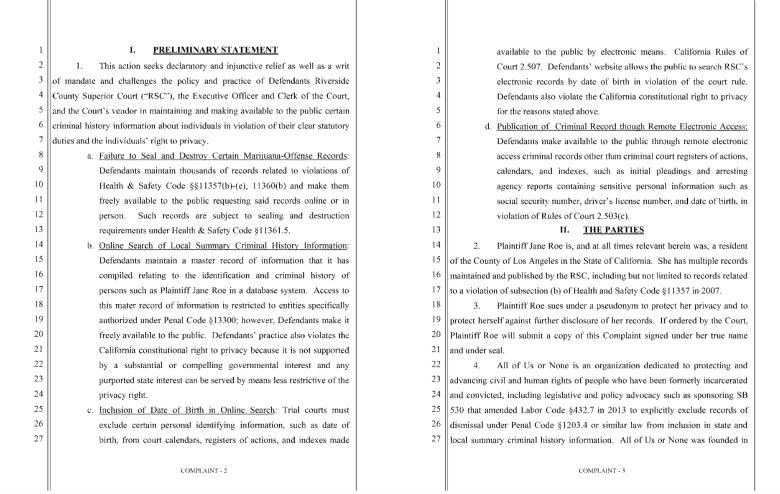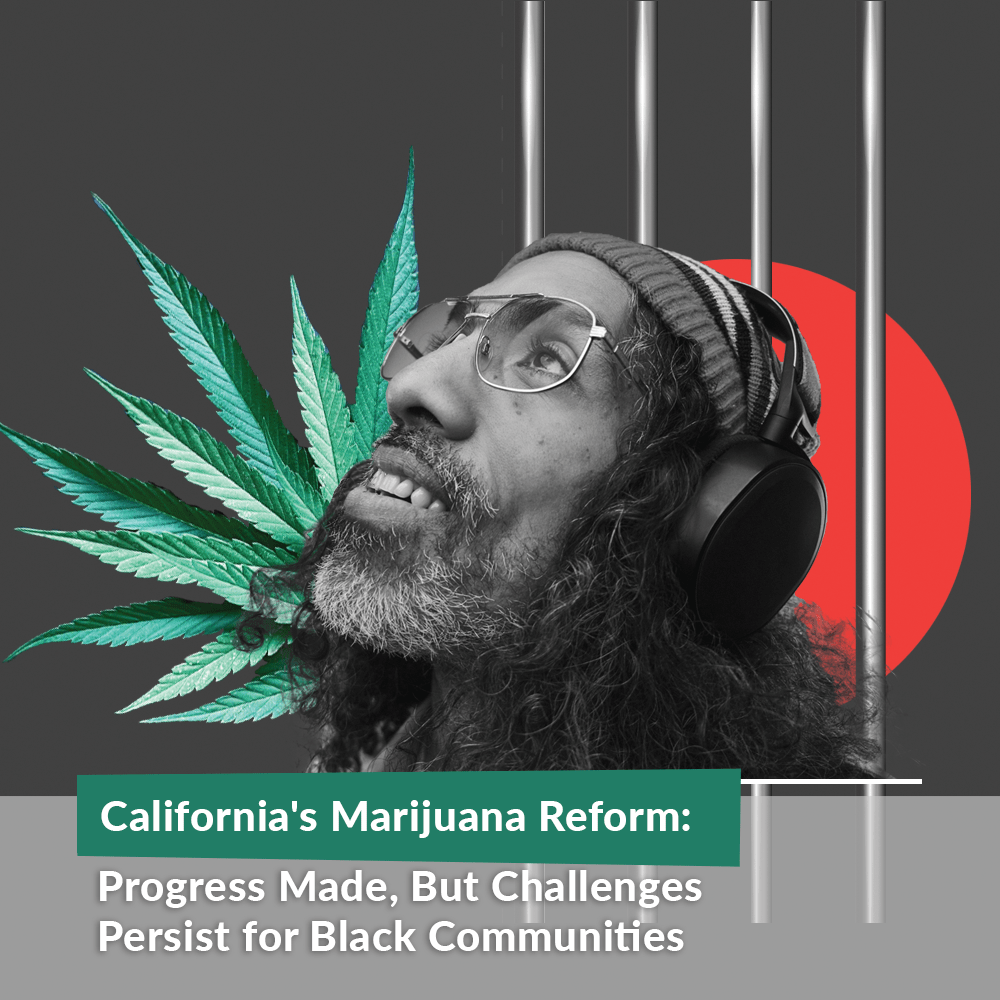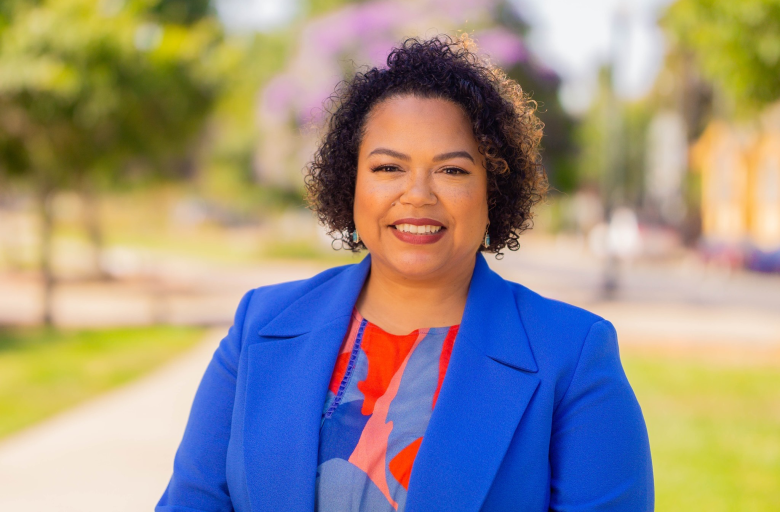Last Updated on September 14, 2023 by BVN
Breanna Reeves
There are certain states that Marlon Bivens, a 41-year old mortgage banker, can’t get a license to practice in because of past cannabis convictions that pop up on his background check.
Bivens has been stopped multiple times on cannabis charges over the last decade, both in Southern California and in Dallas, Texas, where he attended college. He frequently makes the drive to Texas to visit family members and recalled multiple occasions where he has been charged for possession, mailing cannabis and possession of hash.
“I’ve been stopped quite a few times,” Bivens said. “There’s never a real good explanation, to be honest. I believe it is based on the way I look. I’m an African American male with locs — that alone sometimes can be enough.”
In 2020, Bivens was pulled over in a small town 45 minutes outside of Dallas. The officer who stopped Bivens and his friend said it was because he had an out-of-state license plate. Bivens believed there was more to it — “You got two Black males in the car, with California plates coming through.”
The officer found about 14 grams of cannabis in his car, leading Bivens and his friend to be booked and taken into custody. Bivens was able to put up a cash bond that allowed him and his friend to be released with a mandated 24-hour probation and a fine.
At one point in time, Bivens was licensed to operate as a mortgage banker in 38 states, but because of his cannabis convictions many of those licenses were placed in jeopardy. As a result of having a drug-related criminal record, Bivens has been required to provide court documents and present letters of explanation to the different states where he seeks a mortgage banker’s license.

Riverside County Public Defender Steven Harmon explained that having a cannabis conviction on one’s record can be “devastating” to someone seeking a promotion and those who seek a professional license.
In California, a person with a criminal record who holds a professional license could face disciplinary actions such as suspension, fines, practice restrictions and their license being revoked.
“Even though possession and use of cannabis is now legal in California and in a number of other states, for many people it still carries a terrible stigma that this was a drug offense and that the person was into drugs,” Harmon said in an email.
Bivens said that when he inquired about expunging his record several years ago, he learned that the costs associated with doing so was an estimated $750 to $800 — an expensive price he was unwilling to pay at the time.
But for others, having cannabis convictions that should be sealed or cleared on their record can have a paralyzing impact on their lives.
Total Marijuana Arrests by Race
With the decriminalization of cannabis in California and cannabis reform legislation, the state has seen a reduction in marijuana arrests over the last two decades. However, Black and Hispanic people continue to be overrepresented in misdemeanor and felony marijuana arrests, according to data from the California Department of Justice (DOJ). (Data visual by Alex Reed for BVN)
Prior to AB 1793, California’s Prop. 64 required individuals to figure out how to clear their records by a petition and pay for all fees associated with doing so. AB 1793 set out to clear the hurdles left behind by Prop. 64, but the new resentencing law had its own obstacles. With the district attorneys, public defenders and courts responsible for clearing records, there have been difficulties in processing records due to the backlogs, lack of personnel and clarifying eligible records with specific charges like gang enhancements.
Vonya Quarles, cofounder of Starting Over, Inc., said that in a county like Riverside that makes money from criminal record history searches, AB 1793 was an important piece of legislation that would mitigate the impact of cannabis use on people’s lives. Advocates in Riverside have long sought to address the county’s failure to “properly destroy” old cannabis-related offenses.
Vonya Quarles, co-founder of Starting Over, Inc., discusses the impact of not clearing or destroying eligible cannabis records.]
In a 2017 complaint filed by Riverside’s chapter of All of Us or None, a social justice organization, they accused Riverside County Superior Court of allowing the public to access anyone’s criminal history using their driver’s license number or date of birth for a fee. Additionally, with the court failing to destroy or seal records that were granted relief, background check companies were able to access past criminal histories, the suit alleged.

“When it comes to background check companies having that information, it makes a world of difference to someone who’s seeking employment and whether they can get employment based on those convictions that should have been purged,” Quarles explained.
The passage of AB 1793 in 2018, made the state responsible for reviewing and clearing eligible records in an effort to lift the burden off the shoulders of individuals. Yet, three years later, local jurisdictions across the state failed to expedite the process and allowed thousands of cases to languish.
Los Angeles County leveraged the benefits of collaboration and technology
The task of reviewing, processing, resentencing and clearing cannabis records was not an easy feat — a realization that now Los Angeles County District Attorney George Gascón acknowledged. When Prop. 64 was passed in 2016, Gascón was previously the district attorney for San Francisco and took steps to expunge eligible records because few people in the city petitioned to do so themselves.
But, without the appropriate resources, San Francisco couldn’t take on the massive task. In 2018, the district attorney’s office collaborated with Code for America, a nonprofit organization that utilizes technology to foster partnerships among government, public and private sectors.
AB 1793 took effect in 2019, and by 2020, Code for America developed Clear My Record, an automated technology service that starts the process to clear eligible convictions by reviewing and interpreting conviction data. The service was expanded to allow all 58 counties to use the Clear My Record application and implement an AB 1793 toolkit, but not all counties took advantage.
Some counties opted to use their own in-house case systems while others like San Bernardino contracted Microsoft Corporation to update their case management system to improve their existing systems.
Code for America Clear My Record

Code for America is working to shrink the far reaching impact of the criminal legal system. (source: codeforamerica.org)
A Code for America report detailing the results of the LA County partnership found that there were 66,000 cannabis convictions eligible for relief under Prop. 64 that were to be dismissed. DA Jackie Lacey, who was in office up until 2020, requested the courts dismiss 62,000 felony cannabis convictions and 4,000 misdemeanors for cases dating back as far as 1961.
Roughly 53,000 individuals were estimated to receive conviction relief through this partnership. Of those, 45% were Latinx, 32% were Black, 20% were white and 3% were identified as other or unknown race/ethnicity, according to the report.
“At the very beginning of our process, even before I did some internet repairs, when we saw it coming down the pipe, we set up meetings with the court and the public defender’s office on how we could automate it in an efficient way for the court,” Gascón said.
With the support of Code for America, the DA’s office created a digital output file with the appropriate information the courts needed to match digital files within their system. The goal was to make this process as efficient as possible.
A year later, with the help of The Social Impact Center, an LA-based nonprofit organization, Gascón’s office identified an additional 58,000 felony and misdemeanor cannabis cases that dated back thirty years and were eligible for dismissal. These cases were not captured by the California Department of Justice’s (DOJ) data, but were uncovered after an examination of local county court records.
San Diego County takes proactive and collaborative approach
In 2019, the DOJ sent San Diego County more than 35,000 past convictions that were potentially eligible to be reviewed under AB 1793. The district attorney recommended 26,000 of those convictions for reduction or dismissal which was completed by February 2021. It took the superior court an additional seven months to finish reviewing all 35,000 cases.
Like LA County, San Diego started their process of reviewing and dismissing cannabis convictions earlier, in 2018, on the heels of Prop. 64. With personnel from the public defender’s office, the court and the district attorney’s office, the county created a team to compile a list of those who may be eligible to benefit under the new law. Once petitions for relief were filed and processed, the public defender’s office sent letters to those who would benefit.
San Diego County Public Defender Monique Carter said the implementation of AB 1793 was a largely collaborative and “herculean” effort that allowed them to address the tasks outlined in the law ahead of time. The county never faced the risk of missing the prosecution case review deadline.
Prior to Prop. 64 being voted into law, the district attorney’s office reviewed their internal Case Management System for cases with eligible charges.
In other counties, the effort to identify, review and process cannabis convictions was treated as a mostly solitary effort among the district attorney’s office, the superior court and the public defender’s office.
Carter addressed stereotypes that are found in both Riverside and San Bernardino County where collaborative efforts among different agencies and entities are nonexistent.
While counties like Los Angeles and San Francisco partnered with Code for America and other organizations to get started on the process of reviewing and processing cannabis convictions, other counties, particularly Riverside and San Bernardino, did not seek outside partnerships to address such a daunting task.
John A. Henry, chief deputy district attorney at the Riverside County District Attorney’s Office, couldn’t recall if the idea of collaborating with an organization to implement AB 1793 ever came up.
“I don’t know how helpful partnering with outside agencies or utilizing technology to assist with our process would have been beneficial, given that we did not oppose any of the petitions,” Henry said in an email.
San Bernardino Assistant District Attorney Simon Umscheid explained that San Bernardino County had never partnered with any outside organizations regarding criminal histories and had not done so in the instance of AB 1793 due to confidentiality and ethical obligations on behalf of prosecutors.
Code for America launched a successful pilot with five counties by undergoing a background check security process to be able to access criminal history data from the DOJ. Each of the five pilot counties granted the nonprofit permission to engage in this process, as part of their contract.
Recognizing that this process would not be sustainable to do for all 58 counties, Code for America developed an application that allowed a district attorney’s office to input their own data into the program and to do so without Code for America handling any criminal history data.
“[Riverside and San Bernardino Counties] could have taken advantage of our statewide application that would have allowed them to use their own data, with Code for America not ever touching it,” Alia Toran-Burrell, program director of Clear My Record, a service provided by Code for America, shared.
Considering that AB 1793 had little to no guidance or restrictions as to how counties could implement the law, there appears to have been no collective understanding on how to approach the legislation across different counties.
A fractured process
The DOJ sent district attorneys across the state 191,055 potentially eligible cannabis cases for review. The legislation included a July 1, 2020 deadline for the prosecution to send cases to the courts. From there, superior courts were to update case records and notify the justice department.
As of July 2019, the department sent 8,164 cases for review to Riverside County. An internal examination by the county found more than an additional 10,000 cases were identified to be eligible for cannabis sentence modifications. By March 2023, a total of 18,397 cases were reviewed and processed by the courts.
San Bernardino County received 8,039 potentially eligible cases for review. Of those, the county found approximately 5,500 cases that fit the criteria for clearing or resentencing.
Resentencing Map
Following the LA Time investigation into lagging records set to be cleared under AB 1793, AB 1706 required the Judicial Council and the Department of Justice to submit quarterly joint progress reports to the Legislature on the status of cases recalled, dismissed, sealed and redesignated, beginning on March 1, 2023 until June 30, 2024. This interactive graphic displays the amount of people eligible for cannabis resentencing from July 2019 to January 2023. (Interactive map created by Alex Reed for BVN)
One notable flaw in AB 1793 was the failure to give courts a deadline to update the case records. With the emergence of the COVID-19 pandemic in March 2020, AB 1793 was no longer a priority and neither were the efforts to clear thousands of eligible cases.
For the counties that decided to handle the reviewing and processing of such cases without external support, there were other factors aside from the pandemic that contributed to the delay in reviewing and processing cases.
In a letter to the Black Voice News, San Bernardino County’s Lead Deputy District Attorney Brent Schultze shared the fractured process of receiving and reviewing three files of data from the DOJ, totaling 653,040 lines of raw data. The data was not “usable” in that form, so the DA’s technical personnel extracted it and made the data functional.
Once organized, the data was used to create two statements of action for each courthouse in San Bernardino County that hears criminal cases: one with a list of cases to be dismissed and one with a list of cases to be redesignated/reduced to a misdemeanor.
While the county contracted Microsoft to update their case management systems, some cases that predate 1997, when the county computerized its system, were missed.
“It is not feasible to estimate how many cases may have fallen under this situation. Separately, we cannot guess how many cases may have been eligible, but were not included in the Department of Justice’s data,” Schultze wrote.
Similarly, Riverside County pointed out old cases as an obstacle in the process of reviewing and resentencing cases because “there simply aren’t a lot of [accessible] records,” according to Henry.
For convictions that date back 20 years, the DA’s office had difficulty locating appropriate documents like a U.S. Drug Enforcement Administration (DEA) file to confirm the charges and if a person was eligible for relief under the law.
Generally, the process of reviewing and clearing cases is not a complicated one, but with the volume of cases and the age of cases, the process was made difficult.
“Our difficulty was based on gathering all of the information for locating, and gathering all the information about each particular case and defendant,” Henry explained.
Carter acknowledged that the legislature has great ideas, but fails to provide “clear-cut formulas” on how institutions can execute new laws or provide funding and guidance on how it should be utilized.
Oftentimes, local jurisdictions are left to figure out how to implement new laws with no more guidance than “here is the new law, good luck,” Carter said.
State finally sets concrete deadline
In 2022, Assemblymember Mia Bonta (D-Oakland) introduced legislation that provided “clear deadlines and guidance for agencies” — elements that should have been included in the initial legislation. In partnership with the Last Prisoner Project, AB 1706 sought to “resolve implementation gaps” and presented a clear deadline for courts to dismiss, seal or redesignate convictions by March 1, 2023.
While AB 1793 set out to transform drug policies and reduce the harms incurred, the law lacked clear direction, uniformity and instructions for how local jurisdictions should have handled the process. Allowing counties to decide how they reviewed and processed cases without incentives or explicit deadlines ultimately resulted in a series of snags. Such pitfalls continue to highlight a fragmented criminal justice system that leaves those most impacted by the misguided war on drugs — namely Black communities and communities of color — burdened longer than warranted by its consequences.
This investigation was supported with funding from the Data-Driven Reporting Project. The Data-Driven Reporting Project is funded by the Google News Initiative in partnership with Northwestern University | Medill
California’s Marijuana Reform: Progress Made, But Challenges Persist for Black Communities
Part 1: The Legacy of America’s War on Drugs
Part 2: A Fragmented Criminal Justice System Results in Delay
Part 3: Oversight, Consequences and the Promise of Automatic Clearance





